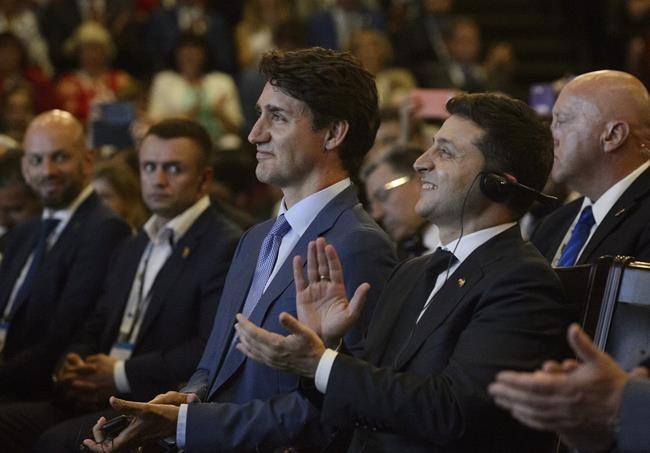OTTAWA — Russia may face further Western sanctions as a consequence of its military buildup on the Ukrainian border, Prime Minister Justin Trudeau said Wednesday.
And Trudeau appeared to confirm that Canada will renew its modest commitment of 200 Canadian Forces personnel to a military training mission in Ukraine, amid rising tensions between the West and Russia.
The Ukrainian government has been waiting on Canada to publicly renew the commitment, set to expire at the end of March, as part of a show of NATO solidarity toward Russia at a time of rising tensions.
Trudeau referenced the Canadian contributions to NATO on its eastern front, which are part of the 30-country alliance's efforts to counter the Russian military gathering on the European border. Those include Canada's command of the NATO battlegroup in Latvia with more than 500 troops as well as its mission to train Ukraine troops that operates under the name Operation Unifier.
"We are all extremely concerned about that and are united as allies around the world in calling on Russia to de-escalate and indicating that there will be significant consequences in the form of sanctions if further aggressive actions are taken by Russia," said Trudeau.
Ukraine President Volodymyr Zelenskyy renewed his call for an extension of the Canadian contribution to the military mission in his country during a phone conversation with Trudeau on Tuesday.
"We are proud that Canada is leading a NATO mission in the Baltic states in Latvia. We are part of Operation Unifier on the ground in Ukraine, training Ukrainian soldiers. We will continue to be there to stand as part of our NATO allies with our friends in the region," said Trudeau.
Trudeau said his call with Zelenskyy was "outstanding," during which he reiterated "Canada's long-standing support and friendship for Ukraine" and "condemned in no uncertain terms the Russian aggression and buildup of troops."
Ihor Michalchyshyn, the executive director of the Ukrainian Canadian Congress, welcomed the news that Canada would extend the training mission in Ukraine. But he called on the government to implement a much tougher set of sanctions on Russian officials under Canada's Magnitsky Act legislation that targets human rights offenders.
Canada has imposed sanctions on Russia under a different regime known as the Special Economic Measures Act in response to the Kremlin's annexation of Ukraine's Crimean Peninsula in 2014.
"Canada has fallen behind in the implementation of sanctions of the U.S. and the EU; no meaningful sanctions actions have been taken against Russia by Canada in over two years," said Michalchyshyn.
Talks between NATO leaders and Russia ended Wednesday in Brussels in an attempt to find a solution to the standoff as Moscow masses 100,000 troops near the Ukraine border, stoking fears of an invasion.
Russia wants NATO to reject Ukraine's bid to join the 30-country military alliance, a demand NATO and the United States flatly reject.
NATO Secretary-General Jens Stoltenberg said after a NATO-Russia meeting on Wednesday that the two sides will set more dates to keep talking, but that the way forward would not be easy given Russia's demand that the alliance stop its eastward expansion.
This report by The Canadian Press was first published Jan. 12, 2022.
Mike Blanchfield, The Canadian Press



